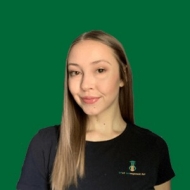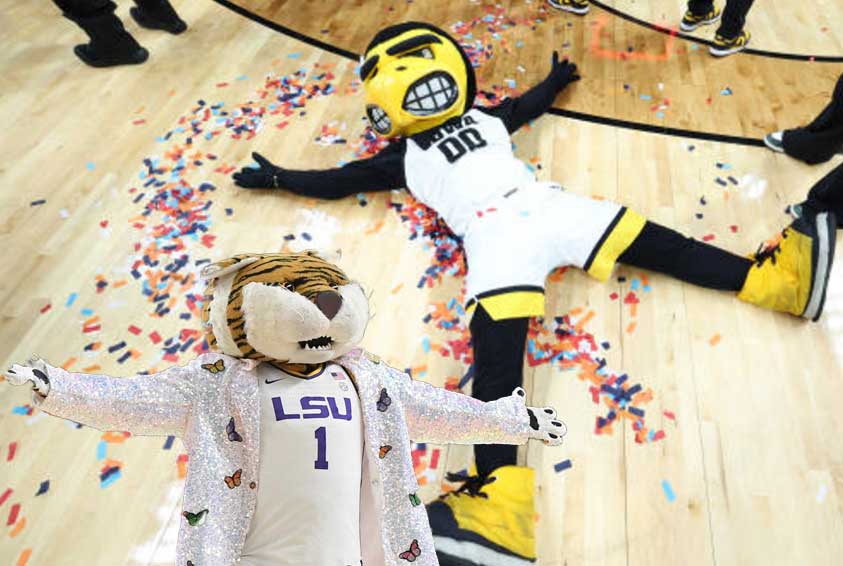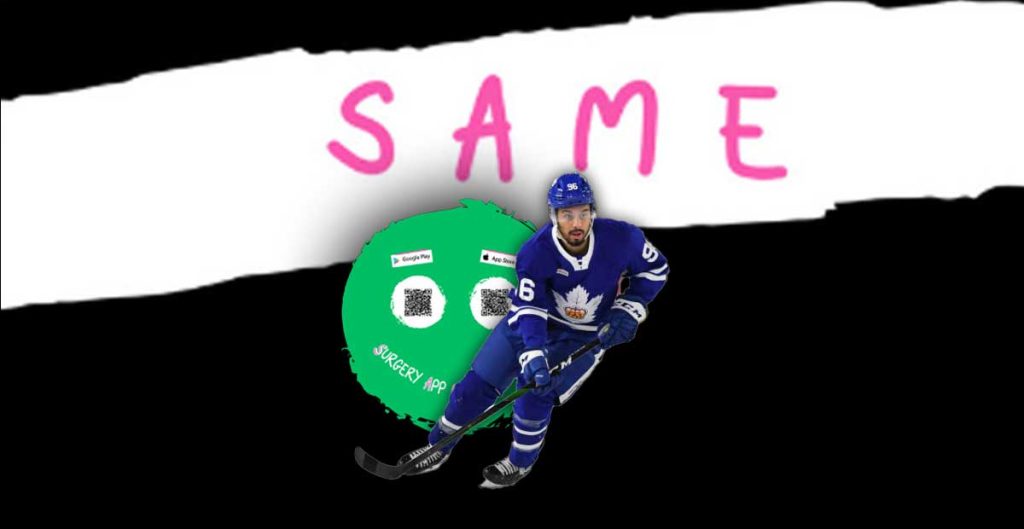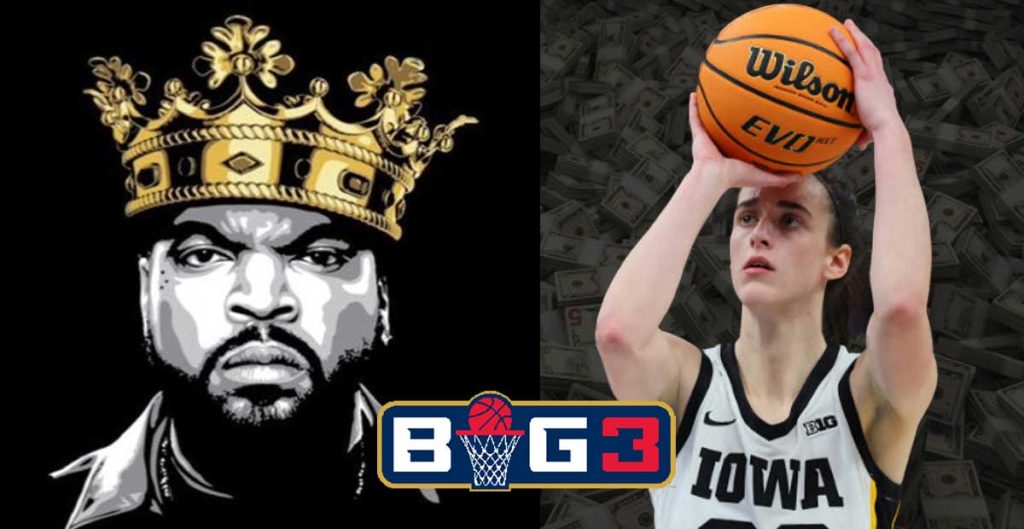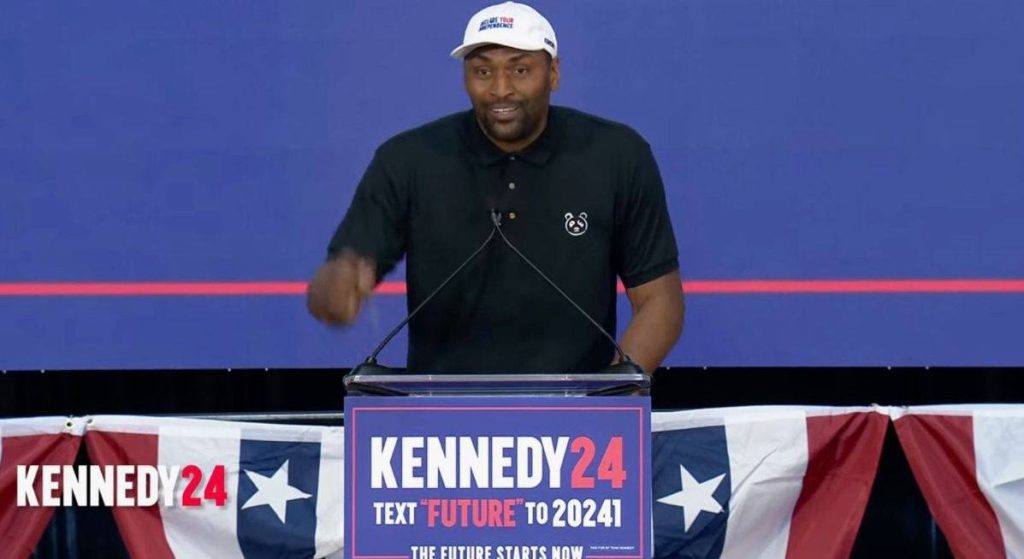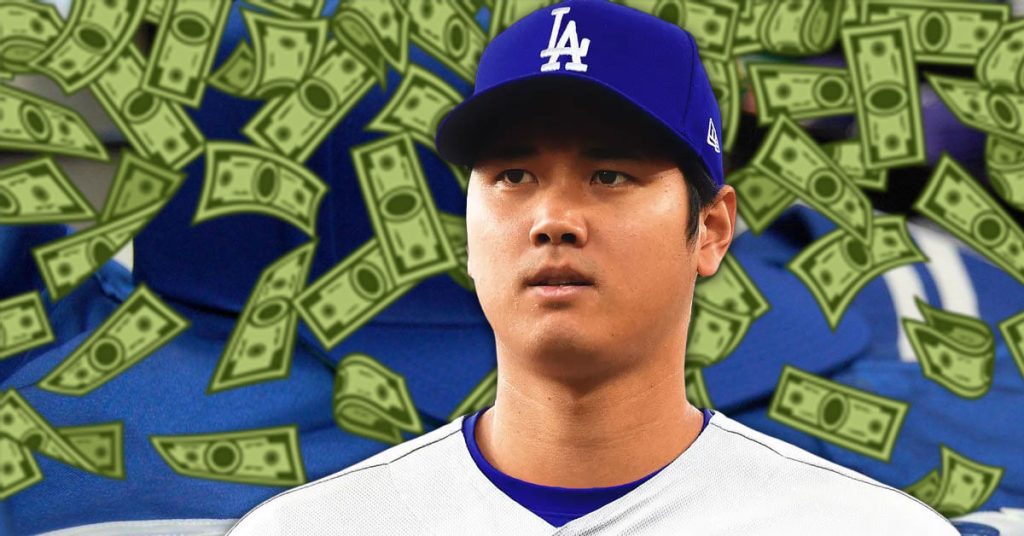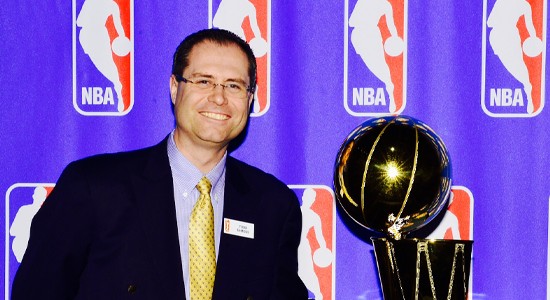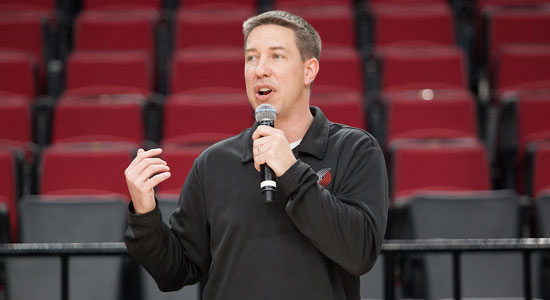
1 on 1 with Todd Bosma | Director of Game Operations | Portland Trail Blazers

We can’t control the outcome of the game, but we can control some of the fan experience, so if we keep our games engaging and entertaining then we are doing our job.
Todd Bosma
Director of Game Operations
Portland Trail Blazers
The Latest
Jontay Porter Banned From The NBA For Life
Iowa vs LSU: A Landmark Moment in Women’s College Basketball
Former NHLer Josh Ho-Sang Now A Rapper
Metta World Peace Endorses RFK Jr. for President 2024
1Tell us about your role as Director of Game Operations & Events for the Portland Trail Blazers. What does a typical day look like for you?
Well, my role as Director of Game Operations & Events for the Portland Trail Blazers means that I am responsible for everything that you see and hear when attending a Trail Blazers game...everything except the game itself.
The same holds true for our large fan-facing events. We are predominately focused on delivering an outstanding experience for our fans regardless of the outcome of the game.
I don’t know if there is such a thing as a “typical day” as far as Game Operations goes which is one of the reasons why I love my job so much.
Game days are obviously the most interesting/complex so here is what looks like: it really starts a few days before game day – prepping videos, skits, contests – figuring out what pieces you have to play with for that game and then putting them in an appropriate order for the flow of the game.
For a 7:00pm game, I usually am at the office between 8:30am and 9:00am. I spend the first 2-3 hours of my day finalizing the game script, a 40-50 page document that is our guide for that particular game.
I say finalize because ideally, I have the script 75-80% done the day before a game so I can use the morning to see if anything new popped up over the evening, do a final check with our partnership department and then proof, edit and adjust the script as needed.
Once that’s done, I meet with our big screen crew – The Director, Technical Director and graphics staff sit down and walk through the script page by page to ensure we have all the appropriate elements needed and discuss how certain time outs will flow (ex. If we are doing an on-court contest, how the contest will run so they can then inform his camera operators where to be/what to look for since we typically don’t get any on-court rehearsal time). At the conclusion of that meeting, its time for a quick lunch.
Back in the office, I am making copies of our script for the rest of our crew, ensuring that we have all the appropriate prizes from our partners for any contests or lucky fan promotions we are doing that night.
Then, I get together with our Guest Services team who handle the distribution of any ingress items and lucky row or section prizes we have and do a final collection of any new music that is needed for our game (we let the players choose what they hear during warm-ups so it can be a scramble to track down a family-friendly version or edit it to make sure its appropriate to play in the arena).
At around 4:30pm, I am headed into the arena for the night. We do an audio sound check to make sure all our videos are cued properly and are ready to go.
Once that’s done, it’s time for our pre-game meeting with the entire crew. Consisting of everyone on our “Game Night Crew” who facilitate the on-court activations and in-stands fan engagement/contesting, our Big Screen director and select cameramen, our lighting director, mascot, music coordinator, photographer and PA Announcer, this meeting is our last chance to go over the script before we do it for real.
Once again, we will walk through the script page by page to make sure everyone knows where they should be and what they should be doing.
That finishes at around 5:30pm which is when doors open, so we make sure music is playing in the seating area, programming is up and running on the big screen before quickly grabbing some dinner. I usually head to my director position by about 6:10pm. We have activations starting at 6:25ish, so once I sit in my chair we are off and running.
Once the game is over, I do some final housekeeping items in the arena and then back to my office to respond to anything that happened during the game, or recap the evening while getting an early jump on the next game which could be in 36 hours.
I usually am leaving the arena by 11:00pm-11:30pm on game nights. It’s a long day but I love every second of it!!
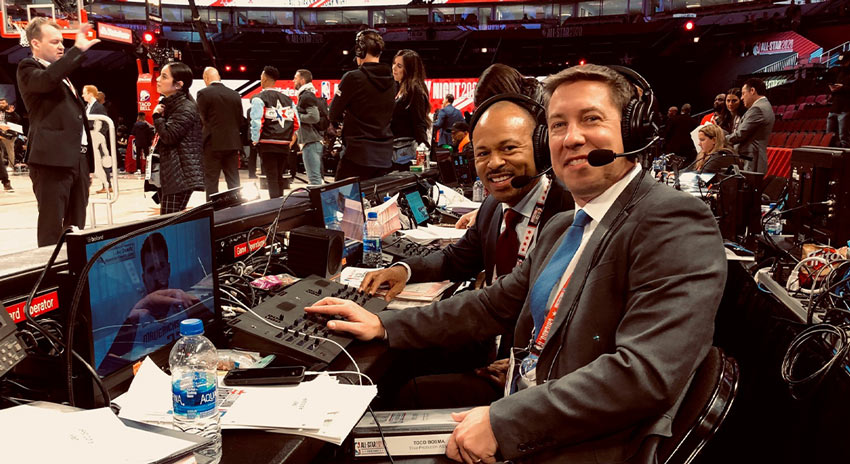
2In Game Operations, there can be a lot happening at once that you have to direct and keep under control. How do you stay on top of everything and also adapt to situations as they occur on game day?
Surround yourself with a great crew, and I think we have the best in the business here in Portland.
Having consistency and quality in your supporting cast, where everyone knows what their roles are and do an outstanding job really makes all the difference and helps you navigate the last second adjustments that need to be made through the game.
It's especially important here in Portland because I am not only the director of the show, but also serve as the In-Arena Emcee so often, when I am out on the court running a contest, our game night crew have to operate without me in their ear advising them on what to do.
It certainly makes things a little crazier, and it only works because of the amazing staff we have here in Portland.
Back to those last-second adjustments too – that’s the beauty of “the show” – making those decisions in a split-second environment. It can be overwhelming at times but, beyond a great crew, it’s all about organization, preparedness and communication.
The devil is truly in the details, so I review the script over and over. My goal as the director is to know the script inside and out prior to the game so that those elements become second nature which allows me to be nimble and adjust quickly in the spur of the moment should we encounter an unexpected situation.
There are a lot of moving parts that go into putting on a game, and in order to be successful you have to communicate to everyone what’s coming up, where are we going next and if something gets moved off a particular time out, where that element is being moved to. I try to remind our crew 2-3 times during gameplay about what is coming up at the next break because we only have one shot at it.
There are no do-overs and if we aren’t prepared, there is no getting that time back; so we have to be on point and ready to go when the time out hits. Once a time out is over, we quickly move on to preparing for the next one because the game moves fast and while we are working on the presentation during gameplay (music, replays, PA Calls, etc.) it’s during those time outs where we really “get to work”.
As far as adapting to the situations, I would say that leading up to tip-off and early on, we follow the script; but once the game starts, we react to the situation and adjust in order to go with the flow. We take our cues from the fans and the energy level inside the arena. Partnership activations are super important, but the fans’ experience should be the focus once we get into game action.
For example, say it is nearing the end of the game, and the home team is losing, but then they go on an 8-0 run to take the lead. The opposing team calls time out and the fans are going nuts. We would be doing a disservice to both the fans and our partners if we ran a normal time out promotion at that time. The fans wouldn’t be happy to settle down to watch a promotion and no partner wants to be associated with disrupting or lessening the energy inside the arena, so when in doubt, we listen and feel the energy from our crowd, take our cues from the crowd, and ride the ride right along with them.
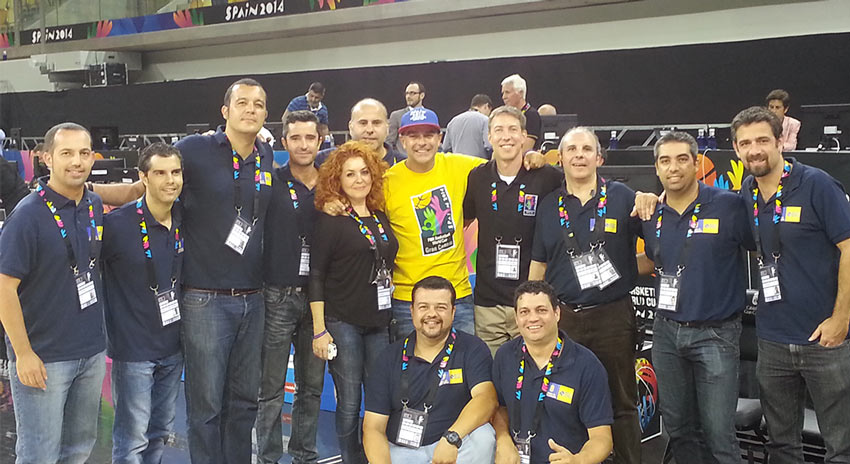
3As teams look to attract repeat attendees, season ticket holders and increase their overall fanbase, what is the Game Operations team at the Trail Blazers doing differently from other NBA teams in regards to engagement strategy to address fans’ needs and wants?
I don’t know if it’s different from what other NBA teams are doing but for us variety is key. Recognize that you have season ticket holders who are coming to all your games, so it's important to mix up what promotions/activations you are doing every game.
We have partners who have 15 activations in their contract, that’s almost 37% of all our games, so we sit with our partners and develop multiple promotions that still deliver their message but keep the activities fresh and different from one game to the next.
That way, while our season ticket holders may be seeing a McDonald’s promotion every 3rd game, it’s not the same promotion and that helps things from getting stale and the promotions from turning into white noise in the arena.
Additionally, it's about recognizing what it is we really are doing - entertainment. It’s expensive to attend games in-person, and there are a lot of other avenues where fans could spend their discretionary income, so our job is to give them a great time beyond the wins and losses.
We can’t control the outcome of the game, but we can control some of the fan experience, so if we keep our games engaging and entertaining then we are doing our job.
To help us accomplish this, we try not to take ourselves too seriously, you have to have a sense of humor and keep things light and fun. If you aren’t enjoying what you are doing, the fans aren’t going to enjoy watching you do it.
Everything we do should be working towards seeing fans walking out of the arena with a smile on their faces, having had a great time even though the home team might have lost the game – that’s the goal.
One thing that we try to do differently here in Portland is have the city be a dominating factor throughout our presentation. We are blessed to have one of the most passionate and loyal fan bases in the league and while they are fanatical about the team, they are equally enthusiastic and vocal about their love of the city.
So, we embrace that and try to make coming to a Trail Blazers game a true authentic reflection of Portland. Things like leasing space on our concourse to local eateries (Portland is very much a foodie town) so you can get some of your favorite meals instead of generic “arena food”, to our graphics used on the big screen.
All of our graphics have some Portland iconic landmark/scenic shot to it because we don’t want it to be where if you just changed the color scheme and logos any other team could use our graphics in their arena.
We try to highlight some of the local talents we have here too and bring them into our show – Ex. Our Game Night Poster Series: https://www.nytimes.com/2018/12/15/sports/basketball/trailblazers-gameday-posters.html We carve out some time during halftime where we only play music from a local upcoming musician. It is with the hope that we can use our platform to elevate and amplify the amazing things and people here in the city while exposing some of our fans to music they might not otherwise ever hear.
Lastly, we have some pretty iconic landmarks here in Portland so besides them showing up as backgrounds for our graphics, we give them a starring role in some of the most important elements of our show.
For example, there is a big painted wall that has the city’s slogan “Keep Portland Weird." Well in a tight game where we really need the crowd to go nuts and help our defense get a stop, we will roll video of that sign then a sound effect hits and the word “Weird” falls off the sign to reveal “Loud” so now the sign reads “Keep Portland LOUD."
The fans love it because it’s not only a way of showcasing the city but, works into the context of a game in an authentic, motivating (but not cheesy) way. It’s a win-win and one of my favorite elements to use to get the crowd going.
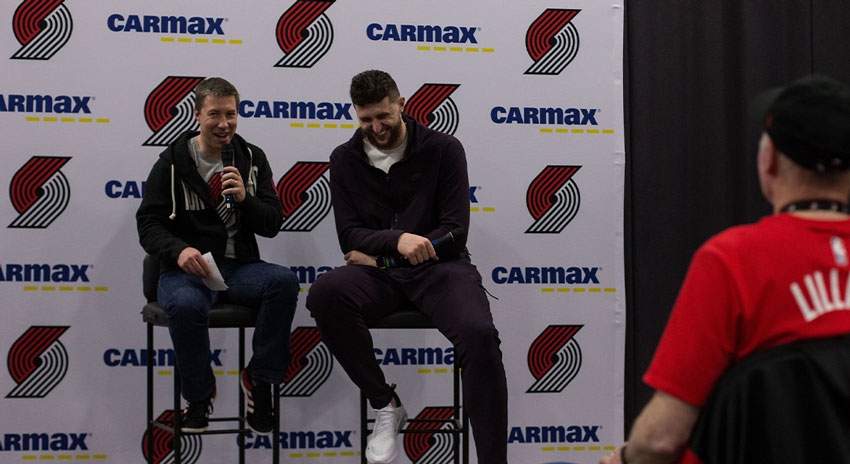
4Fan experience is extremely important – no question about it! In order to improve the fan experience, how do you decipher what ideas, innovations and contests are worth your investment and focus?
Great question!
We try to be open to any and all ideas regardless of where they come from. Everyone has different opinions, likes and dislikes, so we welcome suggestions from everyone.
In Portland, our Game Ops department is pretty small, so we can’t see everything. We encourage different departments to share anything they see that is fun, engaging and memorable, whether it be a TV show, commercial or something another team is doing regardless of the league they are playing in.
Once an idea is brought to us, we first look to what’s in it for the fans? How does this improve their experience? Is it funny? Can they win a prize? Why should they care about the promotion? We try not to say no to an idea, but rather explore all options and build onto it and see if we can develop it into something.
Sometimes we can, sometimes we can’t but there have been times where just going through the exercise has led us to a completely different idea – so no idea is a bad idea.
Thankfully in Portland, we have been given permission to fail. It’s okay if a promotion or activity doesn’t go perfectly, as long as we are trying new things. We also tweak as we go along. We rarely get a promotion right the first time out, so after each game, we look at what worked and what didn’t and how can we adjust and get better for the next time.
It's an important process as we strive to create activations that deliver on a partners’ goals while engaging and entertaining the fans.
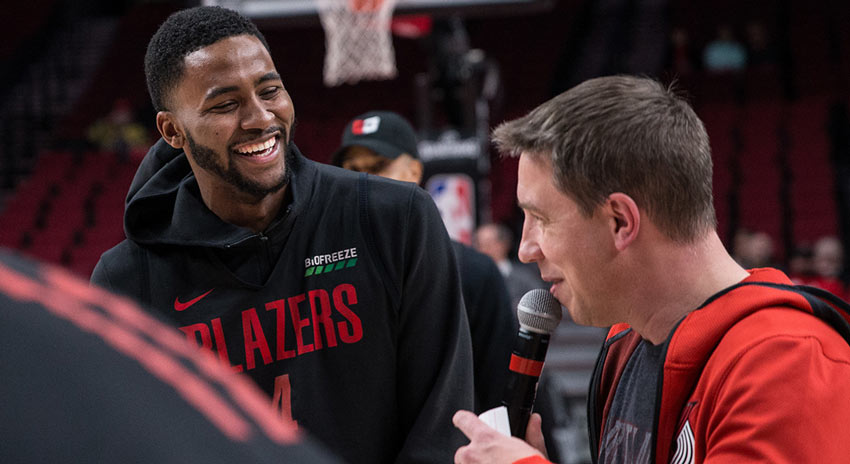
5While working in a sporting event, you often do not see what the public sees. Do you think this is true? What goes on behind the scenes that the public may not realize?
Yes, I definitely think this is true. There is so much going on behind the scenes; it really is intense.
What I don’t think the public realizes is that there are times where we aren’t even watching the game itself because we are getting ready for the next activation.
I think people would be surprised just how much goes into putting on a game. Once the doors open, we are going non-stop until the end of the game, we work through pre-game, game action, halftime, all the breaks; it’s programming a live 2.5-hour show every other day. Here is a Behind the Scenes video our organization did on Game Presentation - https://www.youtube.com/watch?v=ZoGgRwFOSts
On top of all of that, we also have to be on top of our game because time goes quick. If you look at doing an activation during the break between the 1st and 2nd quarter per se, that break is 2 ½ minutes long which seems like plenty of time, but can get tight when you consider all that has to get done. We have to:
- Announce the score at the end of the quarter and allow the court to clear
- Once the court is clear, we load props onto the court
- Do a “lead-in” to the contest and introduce/toss to our in-arena emcee
- The emcee will then explain the contest with rules and tell everyone what our contestants are playing for
- Introduce the contestants
- Run the contest
- Announce the winner and award the prize(s)
- Close the contest
- Remove props and make sure the court is clear with no less than :15 left on that 2:30 “time out clock”
It’s a lot, and everyone has to know exactly what they are doing and where they are going because there is no time to waste. We also have to do all of this to the best of our ability. We like to say that there are no “throw away” moments during the course of our games.
Partners spend a lot of money to have the association with us so we, of course, want their promotions to go well, but also for the fans, it’s expensive to come to our games and sometimes they only get to come to one. Everything we do has an impact on their experience, so we need to be on point with all we are doing.
Of course, there are things that go sideways, so how do you respond to that? Contestants sometimes show up late (or not at all), camera operators are in the wrong spot, contest props get forgotten or broken right before you head out onto the court, etc. While we aren’t “watching” the game, we need to be aware of game situations. Is the energy in the building such where it would do more harm than good to run this promotion at this time – and if you move the activation, where are you moving it to?
Those are the things that go through your mind and the decisions that have to be made quickly – wait too long and you lose the energy of the crowd or run out of time to get everything done during the break. So, you have to be on it at all times.
We have a saying: “Game Ops Never Stops” (in fact we have T-Shirts saying just that) because there are no breaks. We go from doors open to doors close and the ultimate goal in Game Ops is for all that effort and energy never to be noticed. We just want fans to come in, sit down and enjoy the game – think everything happens on its own organically and no one is considering all the work behind the scenes it takes to make it all happen.
6You’ve been with the Portland Trailblazers for almost 22 years. Can you tell us how you’ve seen the organization and fan experience evolve over the years? What initiatives are you most proud of?
It’s changed a lot over the years for sure!
I think one of the most recent evolutions or focus has been how do we engage fans digitally. Go to a sporting event (or think about watching one at home) and everyone is on their phones during breaks or sometimes during game action, so instead of battling against that, how do you embrace that and program for the 2nd screen viewer.
This is going to be extremely important for the upcoming season as we continue to deal with the COVID-19 pandemic. So, we are looking at elements that can be facilitated through our app and working through how we engage with our fans in an environment where there may not be fans inside our arena. It’s making everyone think differently which can help come up with the next latest and greatest ideas and activations.
There are so many things I am proud of – the most is the group that I get to work with every day. They don’t get the credit they deserve, it’s truly an honor to work alongside them. As far as initiatives, I think we have done a great job of capturing the essence of Portland and turning our game presentation into an authentic Portland experience which has really resonated with our fans.
A few years ago, as part of Opening Night, we were able to introduce our players and have them enter the court by coming down through the stands high fiving the fans along the way. It took a lot of work and planning but came off really well and was a unique way to showcase the connection between our players and fans to start the season.
Similarly, we do an activation called our “Game Ball Delivery” where we take the game ball to the last row of the arena and have the fans pass the ball down until it reaches the court where another fan brings it to center court and hands it to the referees. It’s another opportunity to have the fans feel that they are a part of the game and reinforces that our team needs their help all night long.
There have been a lot of events I have been able to be a part of as well:
- 6 NBA All-Star Weekends
- Produced and Directed the All-Star Game in New Orleans (2017), Los Angeles (2018) & Charlotte (2019)
- Produced and Directed All-Star Saturday night in Chicago (2020)
- Produced and Directed the in-stadium experience for the 2014 FIBA Basketball World Championships in Gran Canaria Spain
- Produced & Directed the in-arena experience for the PK 80 tournament. A college basketball tournament celebrating Phil Knight’s 80th Birthday. In November of 2017, we played host to 16 college basketball teams who played 24 games across two venues over 3 days. Talk about a lot of work!
Those are all great and I am super proud of those events, but the most rewarding moments are watching fans in the stands of our games. Seeing them jumping around, hugging and high fiving complete strangers, parents taking their kids to their first game and watching their eyes light up seeing the spectacle of it all – seeing them have those moments and memories – the fact that I had a small part in creating that experience for them, is truly the best part of what we do.
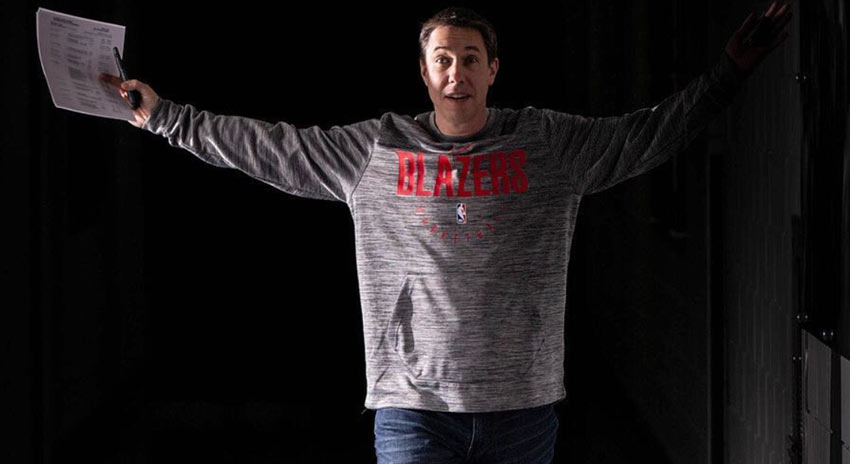
7Managing sporting events is not an easy job by any means! What advice do you give to people that are interested in someday doing what you do?
Get involved! If you are in school, try to get involved in your Student Activities Board. I did that in college and got to try my hand at putting on events for my fellow students such as movies, concerts, final “study break” activities, etc. It was a great learning experience about how to put on events.
Intern if you are able to. If you want a chance to learn about working in sports, an internship is a great way to do it. I interned with the New Jersey Nets (before they moved to Brooklyn) and got to see behind the curtain of what working in sports is like.
If you are able to get an internship, work hard. I tell folks that in an internship you get out of it what you put into it. During my internship, after I finished my assigned job, I went door to door asking any and all departments if there was anything I could assist them with.
I wanted to learn all I could, so I tried to interact with as many different areas of the business as possible. It worked out for me and because of my drive, I was hired as a game night employee and then 3 years later, landed my current gig out here in Portland.
Another great resource is to be a job shadow for a night or two. I know here in Portland we often have people come and shadow us on a game night. Find your local team or event company (minor league sports, event business, concert hall) and see if they will let you come and observe them for a night.
When we have a job shadow, we show them what goes into putting on a game which really gives folks an opportunity to see what it's like to work a game. You’ll find that people who work in this industry are more than willing to help those who are interested in learning more about the industry.
[get_current_post_author_pic_and_name]
After concluding this interview with Todd, I had no doubts about his passion for game operations! For almost 22 years, Todd has been in his role as Director of Game Operations & Events for the Portland Trail Blazers. During that time, Todd has produced a variety of games and events, executed a multitude of activations, and of course, witnessed changes regarding the way game ops is carried out. However, the goal has always been to provide fans with an outstanding gameday experience. The Trail Blazers have an amazing fan base so, Todd and his team do everything they can to make their experience as exceptional as it can be each and every time they visit a game. After all, creating such fun, uplifting experiences for Trail Blazers fans is the most rewarding part of the job for Todd. Although COVID-19 has eliminated fans from stadiums across the NBA, Todd continues to provide an incredible gameday experience just in a different way! The latest and greatest activations are on their way and Todd is up for the challenge in this shifting digital world!

